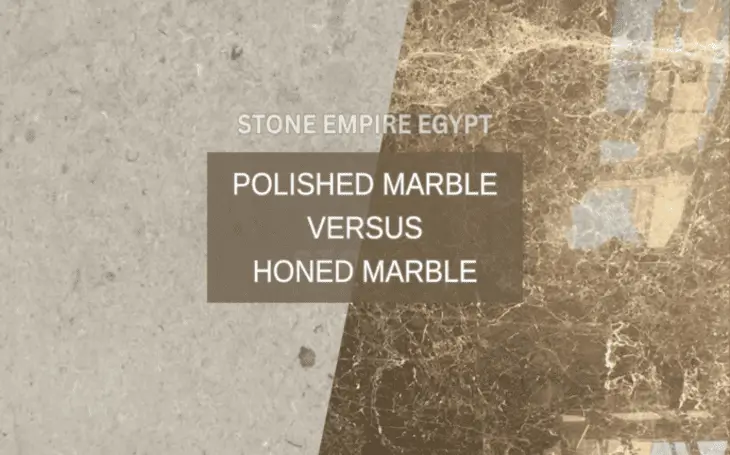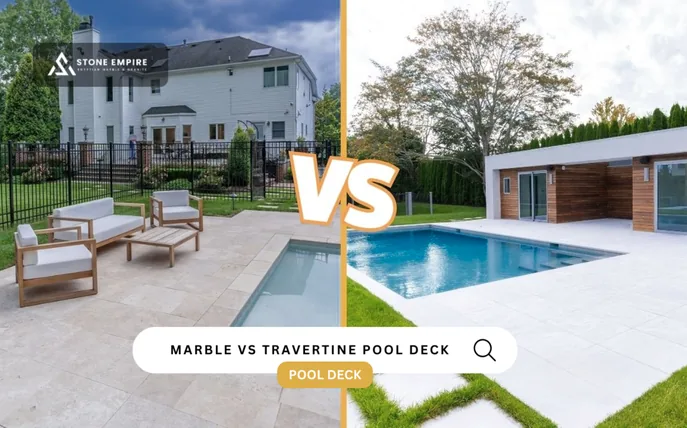Polished versus honed marble comes down to how you want the surface to look and how you want it to perform day to day. Polished marble is glossy and reflective, while honed marble is matte and often better at hiding wear. In this guide, we’ll compare appearance, slip feel, etching vs staining, sealing needs, and the best uses for kitchens, bathrooms, and floors.
Honed Marble Meaning
Honed marble meaning refers to a type of marble surface that offers a smooth, matte appearance without a glossy shine.
When comparing polished versus honed marble, this finish provides several advantages:
1. Non-reflective surface: Offers a natural, understated look.
2. Slip resistance: It’s mainly Ideal for wet areas like kitchens and bathrooms.
3. Scratch concealment: Minor abrasions are less noticeable than on polished marble.
4. Soft texture: Adds warmth and elegance to interior spaces.
This finish suits homeowners looking for both beauty and practicality.
What is Polished marble?
Polished marble is a type of marble surface that has been ground and buffed to achieve a high-gloss, reflective finish, and when comparing polished versus honed marble, the polished finish stands out for its luxurious and elegant appearance.
Here are its main characteristics:
1. Glossy surface: Reflects light, making spaces appear brighter and more open.
2. Rich color enhancement: Polishing deepens the marble’s natural hues and veining.
3. Smooth texture: Offers a sleek, mirror-like touch.
4. Ideal for walls and countertops: Best used in low-traffic or dry areas to preserve the shine.
5. Requires regular maintenance: More prone to scratches and etching from acids.
This finish is perfect for those who want a classic, high-end look in their interiors.
Recommended Stone: Emperador Marble
Polished Versus Honed Marble
| Key Points | Polished Marble | Honed Marble |
|---|---|---|
| Surface Finish | Glossy, reflective, mirror-like | Matte, smooth but not shiny |
| Color Appearance | Enhances and darkens natural color tones | Softens colors, giving a more natural appearance |
| Slip Resistance | Slippery when wet | More slip-resistant, ideal for wet or high-traffic areas |
| Scratch & Etch Visibility | Scratches and etches are more noticeable | Better at hiding minor etching or scratches |
| Maintenance Needs | Requires more frequent sealing and careful cleaning | Easier to maintain in busy areas |
| Best Applications | Countertops, fireplace surrounds, walls | Bathrooms, kitchens, flooring, entryways |
| Aesthetic Feel | Elegant, high-luxury appearance | Soft, rustic, or modern minimalist vibe |
| Durability Consideration | Durable but requires gentle care | More practical for everyday use |
When comparing polished versus honed marble, both finishes offer unique benefits. Choosing between them depends on your aesthetic goals, usage area, and maintenance preferences.
Honed vs Polished Marble Countertops
When deciding between honed vs polished marble for your countertops, the choice depends on both aesthetic and functional needs. Honed marble offers a soft, matte finish that hides scratches better, making it ideal for high-use areas like kitchens.
On the other hand, polished marble gives a reflective, luxurious surface that enhances the natural veining of the stone.
- Polished marble adds elegance and is easier to wipe clean.
- Honed marble provides grip and resists etching better over time.
- Both options require sealing to prevent staining.
- For wet areas, honed or polished marble in bathroom spaces can both work, but honed is generally safer due to its slip-resistant texture.
Choosing the right finish depends on how much traffic the surface gets and your design preferences.
Why is Polished Marble Worth Buying?
Many homeowners weighing polished versus honed marble often ask why the polished option is preferred.
The answer lies in its premium appearance and practical benefits:
1. Polished marble reflects light, making spaces appear brighter and more luxurious.
2. The glossy finish enhances the depth and detail of natural marble veining.
3. It is easier to clean due to its smooth, sealed surface.
4. Polished marble can be slightly less porous on the surface, but both honed and polished marble still need sealing and both can etch from acids.
5. Best suited for countertops, vanities, and elegant flooring.
If you value elegance and minimal upkeep, polished marble is an excellent long-term investment.
Which Should You Choose?
When deciding between polished versus honed marble, your choice depends on function and style:
- Choose polished marble for formal spaces, like bathrooms and living rooms, where shine and elegance matter.
- Select honed marble for high-traffic areas like kitchen countertops and hallways—it's more slip-resistant and hides etching.
- Honed vs polished marble in bathrooms depends on whether you prioritize safety (honed) or luxury (polished).
- Consider your maintenance preference—polished marble requires regular sealing, while honed marble may need more frequent cleaning.
Understanding honed or polished marble benefits will help you match the right finish to your space and lifestyle.
Find Your Dream Marble at Stone Empire Egypt
At Stone Empire Egypt, we specialize in helping you choose the perfect marble finish for every space. Whether you're drawn to the elegant shine of polished marble or the subtle sophistication of honed marble, our wide selection covers every design need.
Our experts guide you through the differences between polished versus honed marble, ensuring you make a confident and stylish decision.
We offer personalized recommendations, high-quality materials, and competitive service tailored to your project.
Request a sample and see the quality for yourself!
Conclusion
In conclusion, understanding the polished versus honed marble distinction is essential when choosing the right finish for your interior or exterior project.
While polished marble offers a glossy, reflective surface ideal for elegance and light enhancement, honed marble provides a more matte, slip-resistant option perfect for high-traffic or wet areas.
Your choice ultimately depends on the function, aesthetic, and maintenance level you prefer. With expert guidance and a wide variety of options, you can select the perfect finish that balances beauty and practicality in every space.
Frequently Asked Questions







